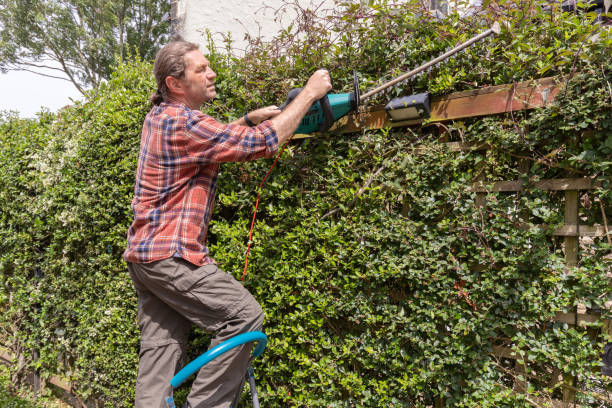Managing overgrown trees and brush is crucial for property safety, aesthetic appeal, and environmental health. Traditional clearing methods can be time-consuming and often ineffective, leaving behind dense vegetation that can hinder access, fuel wildfires, or damage surrounding plants.
Masticating provides an efficient, environmentally friendly solution for managing overgrowth, reducing hazards, and maintaining healthy landscapes.
Mastication is more than simply cutting down vegetation—it mulches and grinds it into smaller pieces that decompose naturally. This process improves soil health, prevents erosion, and creates a safer property by reducing flammable materials. Understanding the benefits of masticating helps property owners make informed decisions about tree and brush management.
Reduce Wildfire Risks
Dense brush and overgrown trees can act as fuel for wildfires, especially in dry climates. Masticating helps mitigate this risk by efficiently reducing combustible material.
- Grind brush and small trees to create mulch instead of leaving debris.
- Target areas near structures and access roads to create defensible spaces.
- Remove ladder fuels that can carry fire from the ground to tree canopies.
By breaking down vegetation into manageable mulch, masticating reduces fire intensity and slows the spread of potential wildfires. A properly maintained property is safer for both residents and emergency responders.
Promote Healthy Tree Growth
Overcrowded trees and shrubs compete for sunlight, water, and nutrients. Masticating helps manage density and promotes healthier growth.
- Thin crowded areas to improve sunlight penetration.
- Remove competing underbrush around mature trees.
- Preserve strategically placed trees to maintain ecosystem balance.
This approach encourages strong root systems and reduces disease and pest problems, creating a thriving landscape over time. Healthier trees are more resilient and less likely to suffer from stress or damage.
Improve Property Access and Safety
Overgrown brush can block pathways, driveways, and work areas, creating safety hazards. Masticating clears these areas efficiently while minimizing soil disturbance.
- Clear paths and access roads for vehicles and emergency equipment.
- Remove low-hanging branches or thick underbrush near structures.
- Maintain clear sightlines for pedestrian and vehicle safety.
Safe and accessible properties reduce the risk of accidents while allowing for easier maintenance and emergency response. Clear landscapes make daily activities and property monitoring simpler and safer.
Enhance Soil Health and Reduce Erosion
Mastication turns vegetation into mulch, which naturally decomposes and enriches the soil. This process prevents erosion, retains moisture, and supports plant health.
- Leave shredded material on-site to act as a protective ground layer.
- Spread mulch evenly to cover exposed soil and prevent runoff.
- Use masticated material to create natural pathways or erosion barriers.
Mulching reduces the need for chemical fertilizers, conserves water, and encourages a healthy ecosystem. Soil enriched with organic material sustains long-term plant growth and property stability.
Save Time and Reduce Long-Term Costs
Compared to traditional clearing methods, masticating is faster, more efficient, and cost-effective. It reduces labor and eliminates the need for hauling debris off-site.
- Process large areas of brush and small trees quickly with specialized equipment.
- Reduce ongoing maintenance by managing regrowth early.
- Lower disposal costs by using on-site mulch for landscaping purposes.
Investing in masticating equipment or professional tree services in Auburn pays off in the long term by keeping properties safer, healthier, and visually appealing with less effort. Efficient clearing saves both time and money over repeated seasons.
Maximize Property Safety and Landscape Health
Masticating is a crucial tool in modern tree and brush management, balancing safety, aesthetics, and environmental health. By reducing wildfire risks, promoting strong growth, improving access, enriching soil, and saving on maintenance costs, it provides a comprehensive solution for overgrown landscapes.
Properly masticated areas are safer, more sustainable, and easier to maintain, giving property owners peace of mind while supporting a healthy, thriving environment.

